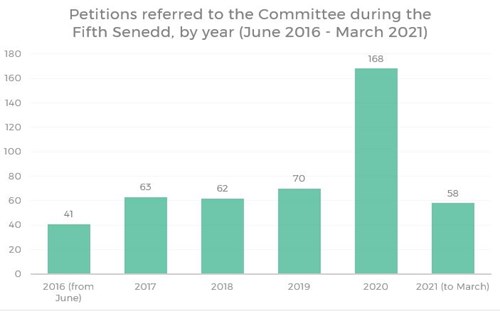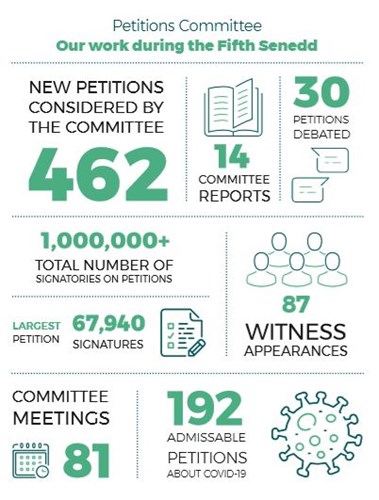Over 1 million signatures were collectively gathered by public petitions during this Senedd term, signalling a surge in engagement with a system which gives a direct avenue for people to influence subjects considered within the Senedd.
At the end of the Fifth Senedd, the Petitions Committee has published a report to reflect on the outcomes of the past five years and to make recommendations for how the petitions process should be run in the Sixth Senedd.
462 new petitions were considered by the Petitions Committee during the Senedd term, with the Committee carrying out detailed scrutiny into the issues they raise. Outcomes resulting from petitions have included a ban on wild animals in travelling circuses, access to a new drug for people with cystic fibrosis and funding for specialist sports prosthetics for child amputees.
In the past year, COVID-19 has inspired an influx of petitions including one with the highest number of signatures received during this Senedd term: with 67,940 signatures gathered, calling on the Welsh Government to Allow supermarkets to sell "non-essential" items during lockdown.
Whilst engagement has been rising steadily since 2007, the pandemic’s impact on our daily lives, along with the launch of a new improved Senedd Petitions website on 30 April 2020, has been credited for a dramatic increase over the past year. A total of 168 petitions were referred to the Committee in 2020, compared to 70 in 2019.

In 2017 the Petitions Committee introduced a new process where petitions with over 5,000 signatures would be considered for a debate in a Senedd Plenary meeting, with the intention that important and time-sensitive issues could be debated at an early stage. This has proved to be a popular and successful measure, with 24 petitions debated through this mechanism.
Due to the combination of the COVID-19 pandemic and the launch of a new petitions system, along with time-pressures in the final months of the Fifth Senedd, the Committee decided to change the threshold to 10,000 signatures with effect from December 2020. Having reviewed the impact of this change, the Committee is recommending that this threshold is initially maintained in the Sixth Senedd, but that it may be possible for it to be reduced once the pandemic is over.
A debate is just one way in which a petition can be considered. All 462 petitions received during this Senedd term have been discussed in meetings of the Petitions Committee and it has ensured that all petitions have a received a response, usually from the Welsh Government. The Committee has carried out detailed inquiries into many petitions, taking written and oral evidence, and it has published 14 reports. In total, 30 petitions have been put forward for a debate.

Chair of the Senedd’s Petitions Committee, Janet Finch-Saunders MS, says:
“During a troubling and difficult year, in the grips of a public health emergency, we have seen just how important the Senedd’s petitions process is in giving people a direct outlet to demand change, suggest new laws and policies, or to voice their support or opposition to decisions.
“More than 1 million signatures have been gathered across this Senedd term, each representing a perspective expressed to the Government and Members of the Senedd. It has been our duty to choose the appropriate action on petitions we have received and we have worked hard to consider and scrutinise all petitions with more than 50 signatures, ensuring that they, at the very least, have received an official response to the issue that they raise.
“We are very proud that a number of petitions, and their surrounding campaigns, have resulted in changes. Many more have been effective in raising the profile of an issue, ensuring the voices of people in Wales are heard loud and clear by their elected representatives in the Senedd and by the Welsh Government.
“As a result of the improvements made to the petitions process and increased awareness of devolved responsibilities as a result of the pandemic, it appears likely that much of the increased engagement with petitions is likely to remain. I am very proud that the Committee has been able to leave this as part of its legacy.”

Outcomes
Determining what constitutes a successful petition is often not straightforward. Ultimately, whether a petition has achieved its aims depends upon the objectives or aspirations of the petitioner and those signing and supporting it. Whilst not an exhaustive list, the report highlights some of the petitions that have achieved outcomes during the Fifth Senedd, including:
- P-05-796 Calling on the Welsh Government to Ban The Use of Wild Animals in Circuses in Wales
During the Committee’s consideration of the petition the Welsh Government committed to bringing forward legislation to ban the use of wild animals in circuses. The Wild Animals in Circuses (Wales) Act 2020 was agreed by the Senedd on 15 July 2020 and became law on 7 September 2020.
- P-05-797 Ensure access to the cystic fibrosis medicine, Orkambi, as a matter of urgency
The petition called for a resolution to negotiations about access to the new cystic fibrosis medicine, Orkambi®, on the NHS. In November 2019 the Welsh Government agreed a deal to make Orkambi® and another cystic fibrosis drug available to patients through the NHS in Wales.
- P-05-817 Specialist prosthetics for child amputees
The petition called for funding to enable child amputees in Wales to have access to specialist sports prosthetics. During the consideration of the petition, the Welsh Government announced the creation of a new fund to provide sports prosthetics for children and young people in Wales in October 2019.
- P-05-854 Make learning disability training mandatory for hospital staff
The petitioners called for training on learning disabilities to be provided to all healthcare staff following the death of their brother in 2009. During a Plenary debate on the petition, the Welsh Government announced that learning disability awareness training would be incorporated into the core training programme for all healthcare staff as part of mandatory equality and diversity training, supported by more in-depth targeted training for staff in key roles.
- P-05-1137 Call for fair funding for the National Library of Wales by the Welsh Government
The petition raised concerns over planned cuts to the workforce and services at the National Library of Wales. During the Committee’s consideration of the petition, the Welsh Government announced additional funding for the Library in financial years 2020-21 and 2021-22 and intended to support key recommendations into its future sustainability.
See the report for more details about the most notable petitions and their outcomes.






